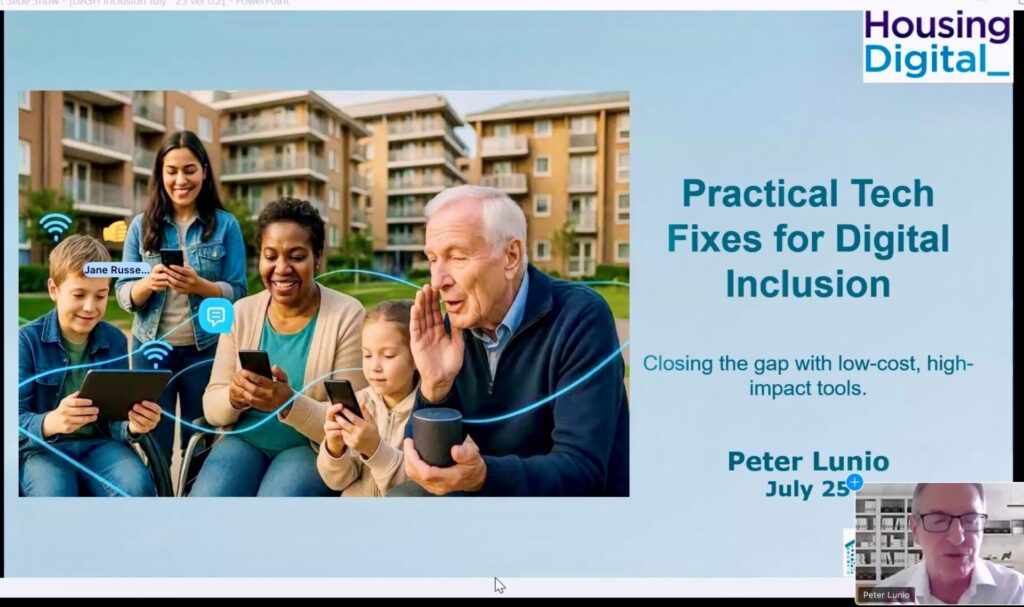What happens when a tenant’s only route to Universal Credit is the Wi-Fi signal leaking through a neighbour’s wall? If you sit on a housing association board, that image isn’t anecdotal; it’s a governance risk flashing amber on your dashboard. Over a third of the UK’s digitally excluded people live in social housing.
The affordability squeeze is brutal. One in four households (≈ 6 million) struggled to pay for phone or broadband services in May 2025, Ofcom finds.
Westminster’s Digital Exclusion inquiry adds that around one million people have already scaled back or cancelled their internet outright as the cost-of-living crisis drags on. Unsurprisingly, social-housing residents are over-represented; internal modelling shows nearly a quarter can’t afford even today’s “social” tariffs.
Skills pose a second cliff-edge. 16.8 million adults fall into the low or very low digital-capability bracket, says Lloyds Bank’s 2024 Consumer Digital Index Lloyds Bank. Add in confidence gaps. Prodo’s sector survey reports 32 % of adults lacking basic online skills, and the slickest portal becomes just another locked door.
Digital exclusion isn’t a side issue; it hurts tenant satisfaction, blows up call-centre costs, and pushes compliance into amber. The suggestions below turn that risk into a playbook: mesh Wi-Fi, pocket translators, and smart speakers. The fixes are quick, cheap, and surprisingly kind.
2. Blind Spots: the risks hiding in plain sight
Before racing to shiny solutions, let’s pause. Three myths still trip up even the best-intentioned associations. Bust them now, and every quick win in the next sections lands faster and cheaper.
2.1 “Wi-Fi is a nice-to-have”
Would we cut water or light when a payslip slips? The UN declared the internet a human right in 2021; Good Things Foundation now calls it a basic utility. Yet 23 % of UK households can’t afford broadband (Ofcom), with social tenants hit hardest. Rochdale’s mesh network solves this for £0.35 per home/month, a tiny price for keeping residents connected.
Takeaway: Treat Wi-Fi like street lighting—shared, always-on, and funded as infrastructure, not charity.
2.2 “Put it online and everyone can use it”
Digital doors need keys. 16.8 million UK adults lack basic digital skills, and 10.2 million remain offline or limited users despite a decade of channel shift. Internally, 32 % of tenants still struggle with online basics. Without data, training or accessibility, even the slickest portal is a locked door.
Takeaway: Every rollout needs a “key-cutting” plan—skills training, plain-language content, translation, and offline fallback.
2.3 “Staff digital upskilling can wait”
Tech only works as fast as your people. Digital Champions improve well-being, reduce repeat contacts, and help thousands online, for the cost of a lanyard. Housemark’s 2025 training roster is already oversubscribed. Newydd’s “train-the-trainer” model showed huge ROI on a small grant.
Takeaway: Capex without staff skills is a false economy. Fund capability first, and the tech pays for itself.
Why this matters. The Regulator’s new Tenant Satisfaction Measures bake digital access and responsiveness into the public scorecard, and the annual Sector Risk Profile demands exclusion sit on every board risk register.
3 Quick-Win Toolkit: three fixes you can pilot before the next quarter
Digital exclusion can feel elephant-sized, yet the fastest gains often spring from small, sharply targeted pilots. Below are three field-tested projects you can lift and shift in one quarter. Each solves a concrete pain-point, carries a price tag that won’t give boards chest-pains, and delivers numbers executives can headline in their board reports.
3.1 Estate-wide mesh Wi-Fi — treat access like street-lighting

The pain. A full 25 % of UK households now struggle to pay for broadband or mobile data; every missed connection shows up in repair calls and arrears chasers.
The fix. Rochdale’s council-mesh blankets two estates with 47+ access points, supporting 1,400 devices daily. A co-op funding model keeps running costs to ≈ 35p per home per month, less than a second-class stamp. Think of it as street lighting for data: always on, shared by all.
ROI for Execs. “Can’t get online” complaints disappear, boosting TSM, while every digital rent reminder saves £1.20 in print and franking. Risk cut for Boards. Live usage logs hand the regulator an auditable trail; nodes sit outside flats, so no GDPR-sensitive kit enters homes.
3.2 Pocket-sized real-time translation—break the language log-jam
The pain. Interpreter phone lines cost ~£30 per 20-minute call and stall every repair visit.
The fix. Together Housing equips officers with Pocketalk handheld translators: 82 languages, one-off £250 device, zero per-minute fees. Break-even arrives after roughly nine uses, often inside a fortnight of tenancy visits.
ROI for Execs. First-visit resolution climbs; repairs backlog shrinks; staff morale rises when conversations flow naturally. Risk cut for Boards. Two-way audio slashes mis-recorded orders (an Ombudsman trigger) and keeps GDPR exposure low no third-party calls.
Flash implementation. Buy five devices + SIMs → one-hour depot demo → track interpreter spend before/after.
3.3 Voice assistants that fight isolation—Echo Dots with a social-value punch
The pain. Loneliness fuels extra GP visits and wellbeing calls your teams can’t resource.
The fix. Beyond Housing placed 10 Amazon Echo Dots with older tenants for £540. Nine weeks later 80 % used the device ≥3 times a day, 89 % felt less isolated, and HACT calculated £ 74,777 social value—a £138 return per £1.
ROI for Execs. HACT-ready numbers drop straight into her social-impact dashboard; early adopters become peer coaches, spreading digital confidence organically. Risk cut for Boards. Devices ride tenant Wi-Fi (or the new mesh), so no fresh contracts; opt-in keeps GDPR low.
Roll-out recipe. Identify ten “often-alone” residents → 30-minute buddy install + printed cheat-sheet → survey at week four.
3.5 Data top-ups for the hardest cases (bolt-on)
The National Databank holds 500,000 free SIMs and has already supported 125,000 people; bundle SIMs with the pilots to ensure no one’s left watching a loading wheel.
Takeaway: three projects, three months, one goal. Switch on the mesh, pocket the interpreter, let Alexa say “hello”, and watch your TSM scores follow suit.
4. The People-Powered Secret Sauce

Digital fixes shine on slides—but they only stick when someone helps residents cross the digital bridge. That’s the role of a Digital Champion: a confident staff member or tenant who volunteers a few hours a week to coach others. No IT degree needed. Digital Unite’s training is bite-sized and badge-based, and 97 % recommend it. The payoff? £9.48 return for every £1 invested.
Proof that the model moves the needle
Digital Communities Wales credits champion mentoring for measurable gains in confidence, health and wellbeing across a six-year, nationwide programme.
Platform Housing “Digital Ninjas” have already helped ≈ 4,000 residents build confidence in 2024-25, slashing follow-up calls and boosting portal use.
Clarion Futures Champions have guided thousands of neighbours through first clicks—more than 2,500 tenants have completed their free skills modules to date.
Funding & ROI – Economic multiplier: £9.48 return per £1 invested (Cebr for Good Things Foundation).Compliance dividend: a champion network is admissible evidence for the Regulator’s 2025 TSM. Low-cash options: apprenticeship levy funds accredited courses; Lottery and NDIA grants favour bids that embed champions.
Takeaway: hardware is one-off, but human software compounds. Invest a sliver of budget in Digital Champions now, and every Wi-Fi node, translator and smart speaker from Section 3 delivers richer value faster.
5 Peek over the Horizon
Three fast-rising tools will shape the next 18 months of digital inclusion and the governance Sally and Bob must prep for.
- Chatbots + predictive nudges. Askporter’s social-housing bot already automates every inbound repair request and self-serves 30 % of tenants without staff touch.
. Feed those transcripts into Mobysoft’s RepairSense module, which flags damp-and-mould risk before the first black spot appears.
- Plain-English AI writers. Textbuddy rewrites dense letters into everyday language (or 50+ other tongues) with one click—an instant boost for the Tenant Satisfaction “clear communication” bar.
- Smart sensors & early-warning dashboards. LOTI’s borough pilot deployed 155 IoT sensors that alert officers when humidity breaches safe levels, heading off costly decants and disrepair claims inside a single year
The Regulator’s March 2025 letter confirms all such data must flow into annual TSM submissions, so boards should budget architecture, not just gadgets.
6. 90-Day Action Playbook: from board vote to boots on the ground.
Digital inclusion can’t wait for a five-year roadmap; residents feel the gap every time the Wi-Fi drops or a letter lands in legalese. The timetable below turns today’s commitments into next quarter’s KPIs.
| Window | High-impact moves | Evidence & pay-off |
| Days 0–30 – Set the mandate & fund pilots | • Add digital exclusion to the risk map alongside fire and damp. • Sign-off estate-wide mesh Wi-Fi (Rochdale model, ≈ £0.35 ph pm). • Ring-fence £ 5k for 20 Pocketalk devices to replace interpreter calls. • Approve Echo-Dot loneliness pilot (10 units, £540). • Join the National Databank; order free SIM stock. • Allocate staff time for Digital Champions. | Rochdale mesh cost & Databank stock ; Pocketalk cost & break-even ; Echo-Dot £74 k social value on £540 outlay ; 4,000 residents helped by Digital Ninjas |
| Days 31–60 – Train, switch on, measure | • One-day Digital-Champion bootcamp (Digital Unite licences). • Mesh Wi-Fi live in the first block; publish QR flyers. • Pocketalk in every officer’s kit; track interpreter spending weekly. • Install Echo Dots with a 30-minute buddy session & cheat sheet. • Baseline Tenant Satisfaction Measures (CH01/CH02). | Champions lift first-contact resolution and cut call times; live usage logs provide a regulatory trail |
| Days 61–90 – Prove impact & decide scale-up | • Review mesh stats: target 10 % jump in digital contacts, 8 % drop in print/post. • Champion impact audit using Good Things ROI calculator (£9.48 return per £1). • Scope chatbot + predictive repairs (Askporter + RepairSense). • Draft board paper recommending estate-wide roll-out or pivot. | Good Things economic multiplier; chatbot/predictive repairs examples |
Cross-cutting KPIs (track monthly)
- Broadband hardship (% households reporting data stress) – aim < 20 %.
- Tenant Satisfaction digital-access score – keep ≥ 80 %.
- Interpreter spend – cut by 50 % vs baseline.
Org nudge: Flip the Wi-Fi switch, pocket the interpreter, let Alexa greet a neighbour, then watch your risk register move from amber to green in one quarter.





